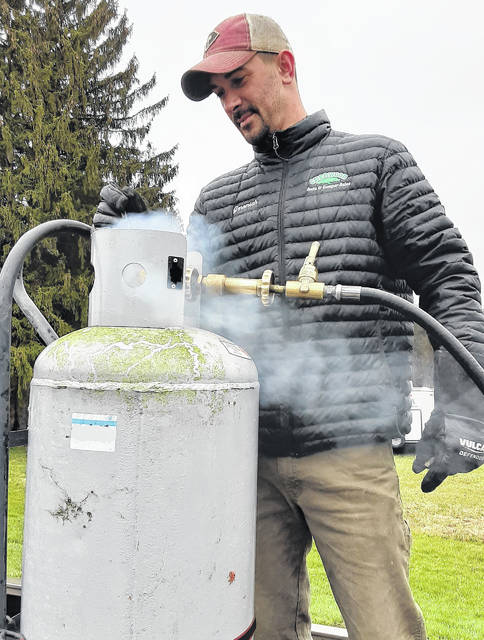
Ohio Gov. Mike DeWine joined 10 other states Sunday in ordering residents to shelter in place by enacting a “stay at home” order signed by Ohio Heath Department Director Dr. Amy Acton.
The directive ordered all “individuals currently living in the state of Ohio to stay at home or their place of residence” from Monday, March 23 through Monday night, April 6, with the only exceptions for leaving listed as “essential activities, essential governmental functions or to participate in essential businesses or operations.”
The order also specifies that “non-essential businesses” cease operations through that time period.
Non-essential businesses include entertainment venues, clothing and jewelry stores, antique malls, bookstores and car dealerships. But auto repair shops and parts stores would be exempt from the order.
With the closings order looming on Monday, Hillsboro resident and U.S. Army veteran Jeremiah Riggs was concerned about the possibility of being put on a two-week furlough from his job at Sherwood Auto and Camper Sales in Hillsboro.
However, under the terms of the “stay at home” order, his job should be safe since as a supplier of propane that is used for both home heating and for cooking, Sherwood’s would fall under Section 12, subsection Q that describes “businesses that sell, manufacture or supply plumbing and heating material.”
Kip Young, one of the sales personnel at Hillsboro Auto Sales, said it would remain open and “see what happens” since there is also an auto repair shop at the dealership.
Others that The Times-Gazette spoke with Monday expressed that they were unclear as to the definition of an essential and a non-essential business, with a clerk at a local mini-mart who preferred to remain anonymous remarking that she “felt like she needed a good lawyer just to figure it all out.”
The 12-page DeWine order spells out clearly those businesses defined as essential, and can be read in its entirety by going to https://coronavirus.ohio.gov/static/DirectorsOrderStayAtHome.pdf.
• Health care and public health operations — These include hospitals, clinics, dental offices, eye care centers, plus a long list of related occupations including veterinary offices. Spas, fitness centers, barber shops, salons and tattoo parlors are considered non-essential and were closed.
• Human service operations — such as nursing homes.
• Essential infrastructure — includes farms, construction, utility maintenance, and trash collection and removal.
• Essential government functions — means all services conducted by the state or any municipality, township, county, political subdivision, board, commission or agency.
• Businesses covered by the order — includes all non-profit, for-profit and educational entities.
• Essential businesses and operations — This is the longest, most detailed section of the order, spelling out in 24 sub-sections what are considered essential businesses. Listed as essential are stores that sell groceries and medicine; food, beverage, licensed marijuana production and agriculture; organizations that provide charitable and social services; religious entities; media; first amendment protected speech; gas stations and businesses needed for transportation; financial and insurance institutions; hardware and supply stores; critical trades; mail, post, shipping, logistics, delivery and pick up services; education institutions, but doesn’t supersede the previous order that closed schools and colleges; laundry services; restaurants for consumption off-premises; supplies to work at home; supplies for essential business and operations; transportation; home-based care and services; residential facilities and shelters; professional services such as legal, insurance, accounting and real estate; manufacture, distribution and supply chain for critical products and industries; critical labor union functions; hotels and motels; funeral services.
• Minimum Basic Operations — describes what is needed at minimum to conduct operations of a business.
• Essential Travel — is defined as any travel necessary for essential activities, government functions, business and operations, and minimum basic operations.
• Social Distancing Requirements — details preventative practices such as six-foot spacing between individuals, frequent hand washing or use of sanitizers, separate operating hours for vulnerable populations such as the elderly and health-compromised, and reaching the business remotely by phone or online.
The intent of the order, it states, is to make sure the maximum number of people self-isolate in their places of residence to the maximum extent feasible while enabling essential services to continue, and to slow the spread of the coronavirus to the greatest extent possible.
DeWine’s “stay at home” order is in effect until 11:59 p.m., Monday, April 6, unless Acton rescinds or modifies it at some point.
Reach Tim Colliver at 937-402-2571.


